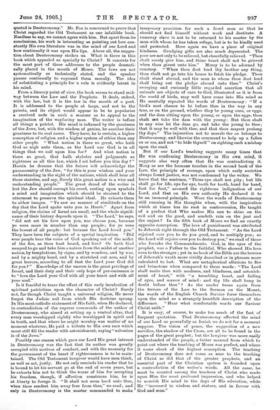A BOOK has lately been published called " Our Lord and
His Bible," by the Rev. H. E. Fox, M.A., Prebendary of St. Paul's (Hodder and Stoughton, Is. 6d.) It is now generally, admitted, he says, that " the pre-Christian Scriptures which are in our bands to-day are identical in all essentials save for translation with those which were studied and quoted by our. 'Lord." There are in the Gospels, he goes on, "not leas than 'seventy unmistakable ,quotations or references to the Old Testament by our Lord Himself," and "the book most often
Needless to say, we cannot agree with him. But apart from its conclusions, his work is interesting as pointing out how con- stantly His own literature was in the mind of our Lord and hovi continually it was upon His lips. Above all, the angges- Ceti about Deuteronomy strikes us. What is there in this book which appealed so specially to Christ? It consists for the most part of three addresses to the people dramati- Cally placed in the mouth of Moses. The laws are not systematically or technically stated, and the speaker pauses continually to expound them morally. The idea of substituting a principle for a rule is evidently latent in his mind.
From a literary point of view, the book seems to stand mid- way between the Law and the Prophets. It deals, indeed, with the law, but it is the law in the mouth of a poet.
It is addressed to the people at large, and not to the priests, and its object would appear to be to popularise a received code in such a manner as to appeal to the imagination of the wayfaring man. The writer is before all things a patriot. His mind is inflamed by the greatness of the Jews, but; with the wisdom of genius, he ascribes their greatness to its real cause. They have, he is certain, a higher conception of religion and a higher system of ethics than any other people. " What nation is there so great, who bath God so nigh unto them, as the Lord our God is in all things that we call upon him for? And what nation is there so great, that hath statutes and judgments so righteous as all this law, which I set before you this day ? " Herein he dreams that the future will acknowledge the paramountcy of the Jew, " for this is your wisdom and your understanding in the sight of the nations, which shall hear all these statutes, and say, Surely thia great nation is a wise and understanding people." The great dread of the writer is lest the Jew should corrupt his creed, resting upon symbols a mind and imagination which should be strained to the uttermost to preserve the spiritual ideal. He exhorts them to abhor images. "Ye saw no manner of similitude on the day that the Lord spoke unto you in Horeb." Apart from religion, the claims of Israel are small, and the whole signifi- cance of their history depends upon it. . " The Lord," he says, " did not set his love upon you, nor choose you, because ye were more in number than any people ; for ye were the fewest of all people : but because the Lord loved you." They have been the subjects of a special inspiration. "Did ever people hear the voice of God speaking out of the midst of the fire, as thou haat heard, and live ? Or bath God assayed to go and take him a nation from the midst of another nation, by temptations, by signs, and by wonders, and by war, and by a mighty band, and by a stretched out arm, and by great terrors, according to all that the Lord your God did for you ? " Knowledge of the unseen is the great privilege of Israel, and their duty and their only hope of pre-eminence is to "love the Lord your God with all your heart and with all your soul."
Is it fanciful to trace the effect of this early inculcation of spiritual patriotism upon the character of Christ ? Surely not, for though Christ taught a universal religion, He never forgot. the Judaic soil from which His doctrine sprang. In His most catholic statement of His faith, when He declared, in contradiction of the express commands of the author of Deuteronomy, who aimed at setting up a central altar, that every man worshipped rightly who worshipped in spirit and in truth, and that where he might worship was matter of no moment whatever, He paid a tribute to His own race which must still fill the reader with astonishment, saying "salvation is of the Jews."
Possibly one reason which gave our Lord His great interest in Deuteronomy was the fact that its author was greatly occupied with motives of conduct, and with the necessity for the government of the heart if righteousness is to be main- tained. The Old Testament lawgiver would have men think, as well as act, justly. He not only reminds his reader that he is bound to let his servant go at the end of seven years, but he exhorts him not to think the worse of him for accepting his freedom, though, if affection constrains him, he is at liberty to forego it. "It shall not seem bard unto thee, when thou sendest him away free from thee," we read; and only in Deuteronomy is the master Commanded to make
temporary provision for such a freed man so that he should not find himself without work and destitute. A runaway slave is not to be returned to his master by the man with whom be has taken refuge, but is to be kindly used and protected. Here again we have a piece of original kindness. Grudging gifts are also much deprecated. The poor are not only to be relieved, but cheerfully relieved. "Thou shalt surely give him, and thine heart shall not be grieved when thou givest unto him." Mercy is to be adorned 135!
courtesy. " When thou dost lend thy brother any thing, thou shalt not go into, his house to fetch his 'pledge. ' Thou shalt stand abroad, and the man to whom thou dost lend shall bring out the pledge abroad unto thee."' Christ's sweeping and curiously little regarded assertion that' all animals are objects of care to God, illustrated as it is from the world of birds, may well have come into His mind as He mentally repeated the words of Deuteronomy : " If a bird's nest chance to be before thee in the way in any tree, or on the ground, whether they be young ones, or eggs, and the dam sitting upon the young, or upon the eggs, thou shalt not take the dam with the young : But thou shalt in any wise let the dam go, and take the young to thee; that it may be well with thee, and that thou mayest prolong thy days." The injunction not to muzzle the ox belongs to Deuteronomy, and likewise the command to help up a fallen ox or ass, and not " to hide thyself " on sighting such a mishap upon the road.
But if our Lord's teaching suggests many times that He was confirming Deuteronomy in His Om mind, Si suggests also very often that He was contradicting it. Many as are the humane touches in the second book of the Law, the principle of revenge, upon which early societies always found justice, was not condemned by the writer. We know that the sentence, " Thine eye shall not pity ; but 'life shall go for life, eye for eye, tooth for tooth, band for hand, foot for foot," aroused the righteous indignation of our Lord, and that on His own authority He declared it to be an immoral principle. Were the words of Deuteronomy still running in His thoughts when, with the inspiration which at times has its root in controversion, He taught of a perfect God Who makes His sun to shine on the evil and on the good, and sendeth rain on the just and the unjust ? In the fifth book of Moses we find an exactly opposite conception. The love of punishment was attributed to Jehovah right through the Old Testament. " As the Lord rejoiced over you to do you good, and to multiply you ; so the Lord will rejoice over you to destroy you," we read of those who forsake the Commandments. God, in the eyes of the prophet, was a Father to the faithful, Who showed His love even to the stranger ; yet in no book of the Bible are the terrors of Jehovah's wrath more vividly described or in phrases more calculated to last. What are metaphorical allusions to fire and brimstone when compared to these words : " The Lord shall smite thee with madness, and blindness, and astonish- ment of heart," with " a trembling heart, and failing of eyes, and sorrow of mind : and thy life shall hang in doubt before thee" ? As the reader turns again front. the terrors of the Law to the Sermon on the Mount, the words of the English Church Service force themselves upon the mind as a strangely heartfelt description of the difference. " Hear what comfortable words our Saviour Christ saith."
It is easy, of course, to make too much of the fact of frequent quotation. That Deuteronomy affected the mind of our Lord as powerfully as Isaiah we do not for a moment suppose. The vision of peace, the suggestion of a new sacrifice, the shadow of the Cross, are all to be found in the pages of the great prophet; but the lawgiver was more easily understanded of the people, a better manual from which to point out where the teaching of Moses was perfect, and where it came short of the highest conception. The teaching of Deuteronomy does not come as near to the teaching of Christ as did that of the greater prophets, and . an essential part of the Christian system is founded upon a contradiction of the writer's words. All the same, lie must be counted among the teachers of Christ who made upon Him the most profound impression, and who helped to nourish His mind in the days of His education, while He " increased in wisdom and stature, and in favour with God and man."



















































 Previous page
Previous page